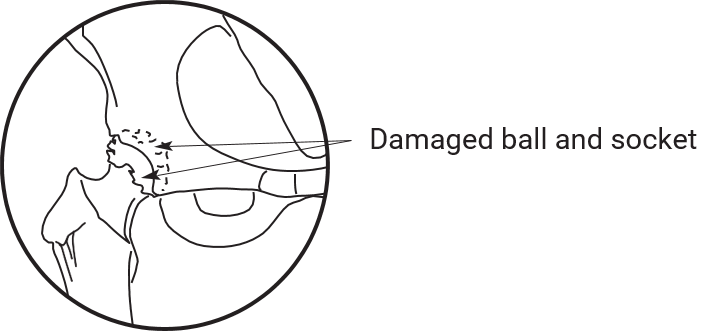A hip replacement is a type of surgery that takes out a damaged hip joint. The hip joint is a ball and socket joint. The ball of the thigh bone fits in the socket of the hip.
This surgery replaces the damaged hip joint with metal, plastic and metal, or ceramic and metal. There are many types of hip replacement parts. The type of material you need depends on:
- the condition of your hip
- your age
- your weight
- the activities you like to do
The goal of hip replacement surgery is to stop or lessen your pain.
Healthy hip

Damaged hip joint

Hip replacement

Why do I need a hip replacement?
You may need a hip replacement if the cartilage (cushioning) between the bones in your hip has worn away. This causes the bones to rub against each other, which leads to pain and stiffness in the hip.
Your healthcare team may suggest a hip replacement if:
- pain keeps you awake at night
- you cut back or stop doing your normal, everyday activities
- you’ve tried other treatments (like medicine and exercise) but the pain and stiffness didn’t get better or got worse
A hip replacement can stop or lessen pain in your hip joint.
What are the types of hip replacement surgery?
There are 3 types of hip replacement surgery. Your surgeon will talk with you about the type that’s best for you.
-
Total hip replacement.
This surgery replaces the whole hip joint with new parts.
-
Hip resurfacing.
This surgery replaces the damaged surfaces in the hip joint with new parts.
-
Hip revision.
This surgery replaces old hip replacement parts with new ones if they get damaged or loose.
What are the risks?
A hip replacement is usually safe, but there are some risks. Your surgeon and healthcare team will talk to you about these risks.
Infection
Germs can enter your body through your mouth, nose, or skin. This can cause an infection. Some medical conditions and lifestyle choices, like diabetes, smoking, and not eating well, can put you at a higher risk of an
infection when you have surgery. You may get antibiotics before and after surgery to prevent an infection.
Let your surgeon or case manager know if you have or think you have an infection.
Blood clots
A blood clot is a clump of blood that forms in a blood vessel. A blood clot can be very serious if it blocks blood flow from the leg back to the heart or if it moves to the lungs.
You have a higher risk of a blood clot if you’re older, very overweight, have cancer, or have had a blood clot before.
You’ll get a blood thinner to help prevent a blood clot. You can also help prevent a blood clot by getting up and moving around as soon as possible after surgery.
Let your surgeon or case manager know if you’ve ever had a blood clot.
Heart attack, lung problems, stroke, and allergic reactions
Any surgery can have risks that include heart attack, breathing or lung problems, a stroke, and an allergic reaction (to medicines used during surgery). In very rare cases, death can happen.
You and your healthcare team will work together to lower these risks and make sure the surgery is as safe as possible for you.
Hip dislocation
A hip dislocation happens when the ball of the new hip joint pops out of the hip socket. You can help prevent a dislocation by following the directions of your healthcare team. It’s also important that you use your equipment
and aids until your healthcare team says you don’t need them anymore.
A longer leg on the side that had surgery
You may notice your leg is longer after your surgery. If this happens, it’s usually only longer by a small amount and doesn’t often need to be treated.
A break in the bone around your new hip joint
There is a risk that you develop a break in the bone around your new joint. If you do, you may need to put less weight on the leg to help it heal or have another surgery.
Nerve damage, bleeding, or injury to a blood vessel
You may notice a loss of feeling or movement or bleeding after surgery. Be sure to tell your healthcare team if you notice these changes.
New hip parts become loose
The parts in your new hip joint may become loose over time. It’s important to go to all of your follow-up clinic visits after surgery. Let your doctor know if you have any new pain in your hip. You may need another surgery
if the parts in your hip joint get too loose.
